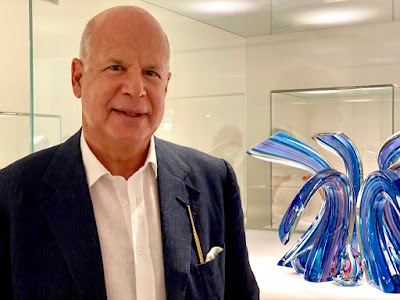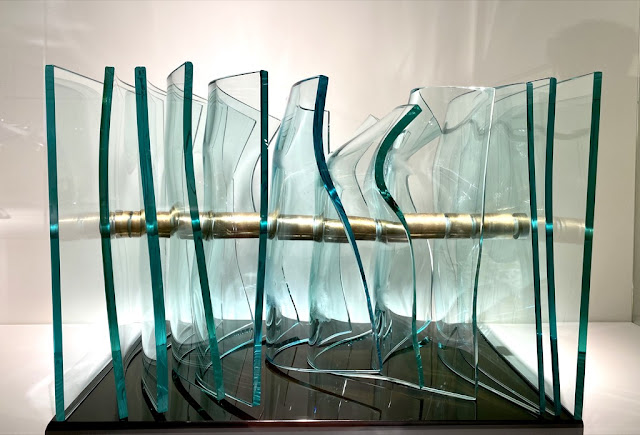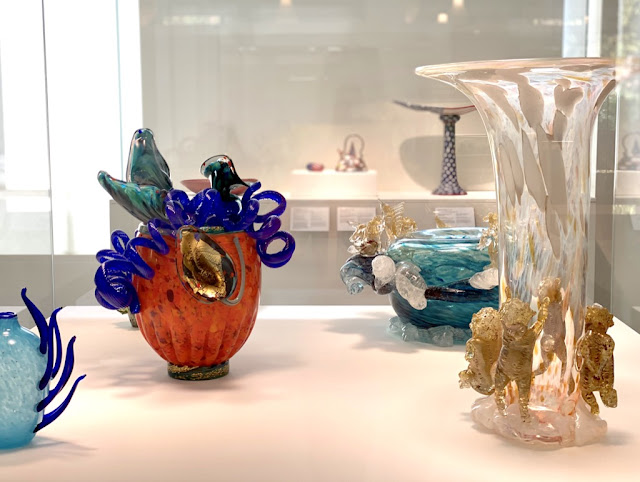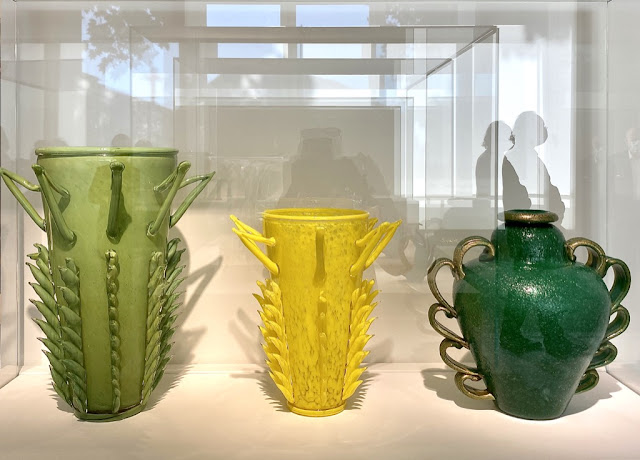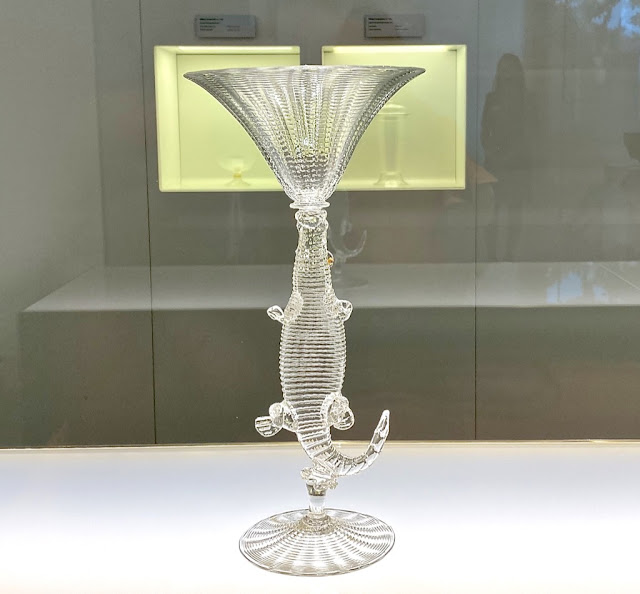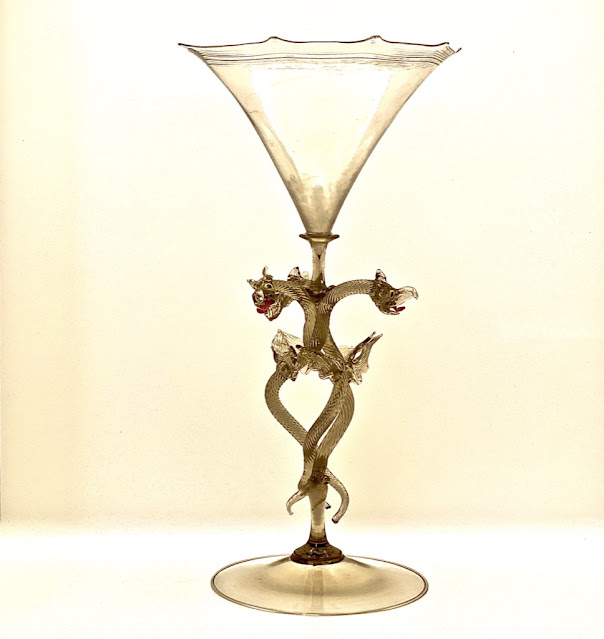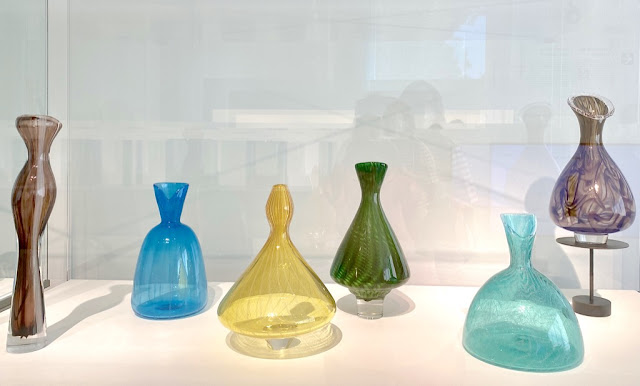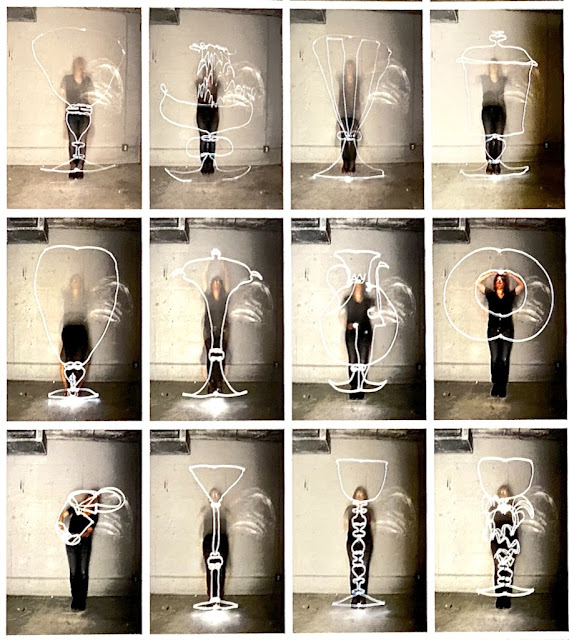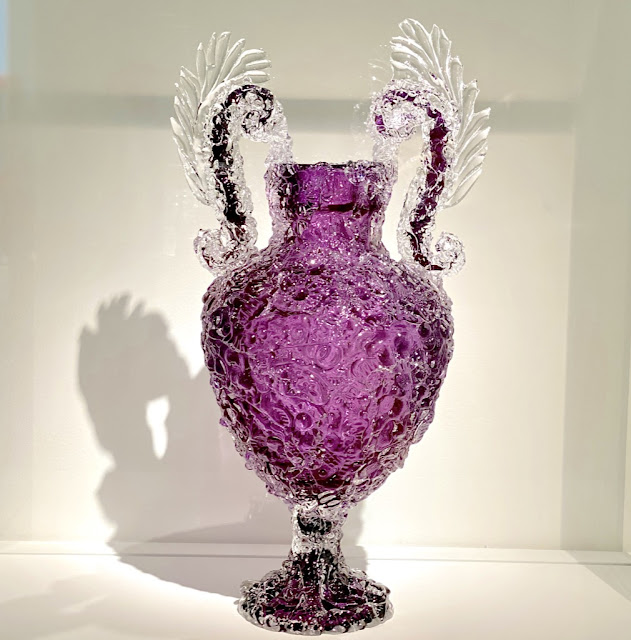“The goal of the mid- to late-20th Century American Studio Glass movement was to free glassmaking from industrial processes and to develop glass in the artist’s studio as a material for contemporary art. Some artists took the new studio glassblowing in experimental and innovative directions in the late 1960s, yet most Americans were hampered by their lack of technical knowledge.”
Isola di San Giorgio Maggiore
Le Stanze del Vetro
Venice and American Studio Glass
Right across from Piazza San Marco and Palazzo Ducale on the island of San Giorgio Maggiore in the Stanze del Vetro - Venice and the American Studio Glass show – until January 10 - is curated by Tina Oldknow and William Warmus. Gathering 155 outstanding glass vessels, sculptures and installations created by 60 American and Venetian artists, this exhibition is the first to closely examine the influences of traditional Venetian glass-working techniques, as well as the Venetian aesthetic, on the American Studio Glass from the 1960s to the present.
https://lestanzedelvetro.org/en/exhibitions/venice-and-american-studio-glass-2/
Venice and American Studio Glass
By 1960, glassblowing had become industrialized in the United States and many skills were lost, so American Studio Glass artists looked to Europe, and especially to Venice and the glassblowers on the island of Murano, for guidance. What ensued was a “love affair” with Venetian glass-working that, by the end of the 1990s, had spread throughout the United States and worldwide.
Harvey K. Littleton - Blue Projectile Impact – 1984
This iconic glass sculpture, shot with a rifle, is symbolic of the bold new directions in glassmaking that Americans wanted to take.
The sense of arrested movement that can be seen in this sculpture is characteristic of Littleton’s work at that time, as is the way in which the colors are multiplied and magnified inside the glass.
David Landau
Dale Chihuly – Cobalt Goblet – 1971
Pioneering artists such as Dale Chihuly and Benjamin Moore traveled to Venice, learned Venetian techniques, and then invited Venetian maestros to the United States to teach.
Harvey K. Littleton – Distortion Box II – 1974
Dan Dailey – Prima Donnas – Circus Vase - series – 2019
Dale Chihuly
Cadmium Orange Venetian #350 – 1990
Payne’s Gray Venetian #24 - 1989
both made with Lino Tagliapietra
Richard Marquis
Stars and Stripes Acid Capsule #4 – 1969-1970
Crazy Quilt Teapot – 1985
Richard Marquis, who also traveled to Venice, developed entirely new uses for the Venetian mosaic technique, known as murrine, for his American flag-inspired objects, crazy quilt teapots, and Marquiscarpa vessels.
Dale Chihuly
Olive Green Venetian with Sawtooth Flanges
Chrome Yellow Venetian – 1989
Napoleone Martinuzzi
Anfora Pulegoso a Dieci Anse – 1925
These experimental vessels were made during Chihuly’s first ‘Venetians’ blow with Lino Tagliapietra in Seattle.
Benjamin P. Moore – Interior Fold Plater – 2001
Moore traveled to Venice, learned Venetian techniques, and then invited Venetian maestri to the United States to teach at Pilchuck. His body of works focuses specifically on Venetian aesthetics, and is inspired by mid-20th-century Venetian glass design.
Benjamin P. Moore – Pala Set – 2008
Preston Singletary – Alligator Goblet – 1990
Singletary introduces American narrative elements into his lighthearted goblets – think of the Everglades of Florida.
Salviati dott. Antonio – Calice da Parata Fume’ Con Tre Serpenti Alati – 1880
Richard Royal – Tropical Leopard Skin Scroll – 2015
Royal’s work is not Venetian-inspired. But, like many other artists in this exhibition, Royal uses Venetian techniques in the making of his vessels and sculptures.
Dante Marioni
Red Parquet Mosaic Vase – 2007 Yellow in Red – Z – Leaf Pair – 2017
Pink Reticello Urn – 2010
Lino Tagliapietra - Dinosaur – 2018
William Morris
Canopic Jar: Elk – Spike – 1993
Canopic Jar: Hawk – 1993
Canopic Jar: Raven – 1993
After meeting Pino Signoretto, Morris made a series of hot-sculptured bones. Then he embarked on the first of many widely recognized series of works: the blown and sculptured Canopic Jars, which are an American hunter’s and naturalist’s (Morris was both) interpretation of ancient Egyptian prototypes.
Flora C. Mace – Joey Kirkpatrick - The Edge of Certainty – 2002
Mace and Kirkpatrick explore the idea of the vessel as a metaphor for the body and identity.
Venini’s New Look – 1952
In the 1952 Venice Biennale, Venini entered a display of vases designed not by the factory’s artists and architects, but by the glassblowers themselves. The unusual shapes and cloth-like patterning were based on the haute couture New Look of Christian Dior 1947 collection, which the owner’s French wife wore when she visited the factory. Ginette Gignous Venini was intimately involved in running the company with her husband Paolo Venini, and she could often be seen by the male workers in the furnace room as she ascended and descended the stairs to the office. A few of these glass pieces were put into limited production and presented as designs of Paolo or Ginette Gignous Venini.
James Mongrain – Atlantis Series – 2014
Mongrain takes highly skilled goblets making to an over-the-top, monumental scale, pushing process to create vessels that are more architectural than functional.
Katherine Gray – Acqua Alta – 2008
Gray delves into the narrative potential of the vessel, creating poignant stories around vessels that reflect history and current events.
Kim Harty – Old Venetian Glass – digital print - 2013 – detail
Harty uses the goblet, specifically, to explore identity, comparing the form of her body with the traditional goblet shapes that she draws in hot glass around her.
Laura Donefer – Jeff Mack – Violet Amphora Classico Moderno 2017
Michael Schunke – Sacrificial Vessel Trio – 2019
Schunke has perfected Venetian-style goblet making, which he practices as a profession.
Lino Tagliapietra – Calice Floreale – 1991-1994
Charles Savoie – Zanifirico Jetson Goblets – 2019
Savoie has perfected Venetian-style goblet making, which he practices as a profession.
Martin Lipofsky – Venini Series – 1972
made with Gianni Toso
Fondazione Giorgio Cini – Carnelutti Hall
Dale Chihuly – Laguna Muran Chandelier – 1996
in collaboration with Pino Signoretto and Lino Tagliapietra
For the first time Le Stanze del Vetro reaches outside of its usual exhibition space and moves into Fondazione Giorgio Cini’s Carnelutti Hall which has become the stage for the spectacular work in glass for the Laguna Murano Chandelier. The chandelier, produced in 1996 in Murano by Dale Chihuly, together with the glass maestri Lino Tagliapietra and Pino Signoretto, consists of five blown and densely- sculptured elements that are executed in a rich palette of brown, amber, yellow and opalescent glass. Sea gods, mermaids, and a bounty of sea creatures rise out of the seaweed-like glass curls of this spectacular and historic installation that pays homage to Murano and to the Venice lagoon.



